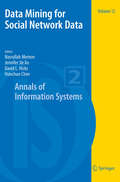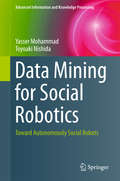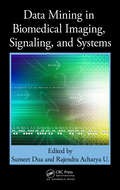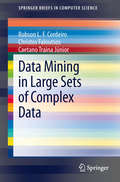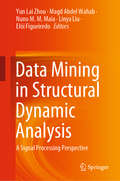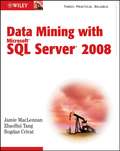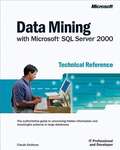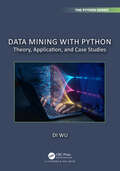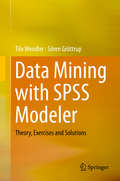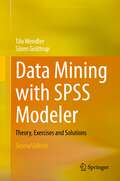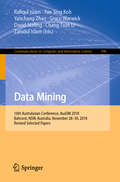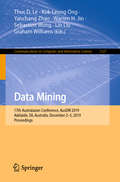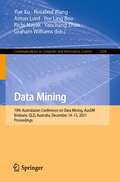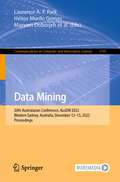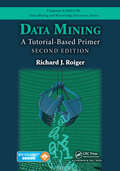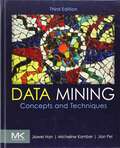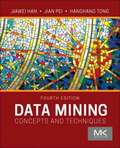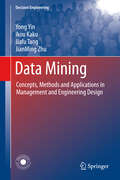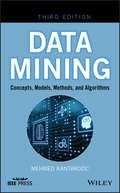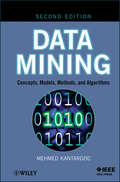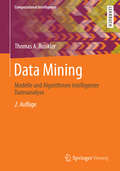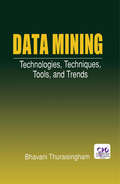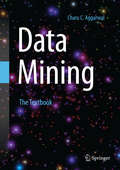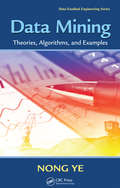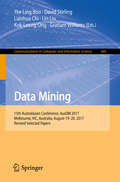- Table View
- List View
Data Mining for Social Network Data (Annals of Information Systems #12)
by Hsinchun Chen Nasrullah Memon David L. Hicks Jennifer Jie XuDriven by counter-terrorism efforts, marketing analysis and an explosion in online social networking in recent years, data mining has moved to the forefront of information science. This proposed Special Issue on Data Mining for Social Network Data will present a broad range of recent studies in social networking analysis. It will focus on emerging trends and needs in discovery and analysis of communities, solitary and social activities, activities in open for a and commercial sites as well. It will also look at network modeling, infrastructure construction, dynamic growth and evolution pattern discovery using machine learning approaches and multi-agent based simulations. Editors are three rising stars in world of data mining, knowledge discovery, social network analysis, and information infrastructures, and are anchored by Springer author/editor Hsinchun Chen (Terrorism Informatics; Medical Informatics; Digital Government), who is one of the most prominent intelligence analysis and data mining experts in the world.
Data Mining for Social Robotics: Toward Autonomously Social Robots (Advanced Information and Knowledge Processing #0)
by Yasser Mohammad Toyoaki NishidaThis book explores an approach to social robotics based solely on autonomous unsupervised techniques and positions it within a structured exposition of related research in psychology, neuroscience, HRI, and data mining. The authors present an autonomous and developmental approach that allows the robot to learn interactive behavior by imitating humans using algorithms from time-series analysis and machine learning. The first part provides a comprehensive and structured introduction to time-series analysis, change point discovery, motif discovery and causality analysis focusing on possible applicability to HRI problems. Detailed explanations of all the algorithms involved are provided with open-source implementations in MATLAB enabling the reader to experiment with them. Imitation and simulation are the key technologies used to attain social behavior autonomously in the proposed approach. Part two gives the reader a wide overview of research in these areas in psychology, and ethology. Based on this background, the authors discuss approaches to endow robots with the ability to autonomously learn how to be social. Data Mining for Social Robots will be essential reading for graduate students and practitioners interested in social and developmental robotics.
Data Mining in Biomedical Imaging, Signaling, and Systems
by Rajendra Acharya U Sumeet DuaData mining can help pinpoint hidden information in medical data and accurately differentiate pathological from normal data. It can help to extract hidden features from patient groups and disease states and can aid in automated decision making. Data Mining in Biomedical Imaging, Signaling, and Systems provides an in-depth examination of the biomedi
Data Mining in Large Sets of Complex Data (SpringerBriefs in Computer Science)
by Christos Faloutsos Caetano Traina Júnior Robson Leonardo Ferreira CordeiroThe amount and the complexity of the data gathered by current enterprises are increasing at an exponential rate. Consequently, the analysis of Big Data is nowadays a central challenge in Computer Science, especially for complex data. For example, given a satellite image database containing tens of Terabytes, how can we find regions aiming at identifying native rainforests, deforestation or reforestation? Can it be made automatically? Based on the work discussed in this book, the answers to both questions are a sound "yes", and the results can be obtained in just minutes. In fact, results that used to require days or weeks of hard work from human specialists can now be obtained in minutes with high precision. Data Mining in Large Sets of Complex Data discusses new algorithms that take steps forward from traditional data mining (especially for clustering) by considering large, complex datasets. Usually, other works focus in one aspect, either data size or complexity. This work considers both: it enables mining complex data from high impact applications, such as breast cancer diagnosis, region classification in satellite images, assistance to climate change forecast, recommendation systems for the Web and social networks; the data are large in the Terabyte-scale, not in Giga as usual; and very accurate results are found in just minutes. Thus, it provides a crucial and well timed contribution for allowing the creation of real time applications that deal with Big Data of high complexity in which mining on the fly can make an immeasurable difference, such as supporting cancer diagnosis or detecting deforestation.
Data Mining in Structural Dynamic Analysis: A Signal Processing Perspective
by Magd Abdel Wahab Yun Lai Zhou Nuno M. M. Maia Linya Liu Elói FigueiredoThis book highlights the applications of data mining technologies in structural dynamic analysis, including structural design, optimization, parameter identification, model updating, damage identification, in civil, mechanical, and aerospace engineering. These engineering applications require precise structural design, fabrication, inspection, and further monitoring to obtain a full life-cycle analysis, and by focusing on data processing, data mining technologies offer another aspect in structural dynamic analysis. Discussing techniques in time/frequency domain, such as Hilbert transforms, wavelet theory, and machine learning for structural dynamic analysis to help in structural monitoring and diagnosis, the book is an essential reference resource for beginners, graduates and industrial professionals in various fields.
Data Mining with Microsoft SQL Server 2008
by Jamie Maclennan Zhaohui Tang Bogdan CrivatUnderstand how to use the new features of Microsoft SQL Server 2008 for data mining by using the tools in Data Mining with Microsoft SQL Server 2008, which will show you how to use the SQL Server Data Mining Toolset with Office 2007 to mine and analyze data. Explore each of the major data mining algorithms, including naive bayes, decision trees, time series, clustering, association rules, and neural networks. Learn more about topics like mining OLAP databases, data mining with SQL Server Integration Services 2008, and using Microsoft data mining to solve business analysis problems.
Data Mining with Microsoft® SQL Server™ 2000 Technical Reference
by Claude SeidmanThe amount of information stored in corporate databases is exploding exponentially. Data mining--finding meaningful patterns in all that data--can give any organization a competitive advantage. This book is the in-depth reference from Microsoft® for anyone who wants to take full advantage of the powerful data-mining features in SQL ServerTM 2000. It examines the SQL Server 2000 Analysis Services architecture and shows how data mining fits into its complete suite of information-extraction technologies. Then it demonstrates how to structure and mine large databases with the algorithms included with SQL Server 2000 to find nuggets of useful information. It even shows how to create a practice data-mining model using data downloaded from a database. Coverage includes: INTRODUCTION TO DATA MINING: What data mining is and isn't, plus important principles and definitions behind data-mining methodologies, including the role of data-mining models, statistics, and algorithms SQL SERVER 2000 ARCHITECTURE: How data mining fits into the SQL Server 2000 Analysis Services architecture and how it builds on the SQL Server 2000 relational database and its embedded online analytical processing (OLAP) engine DATA-MINING METHODS: How to choose the best data-mining method for the job--decision trees or clustering EASE OF USE FEATURES: How to use the Mining Model Wizard and the OLAP Mining Model Editor to simplify creating, training, and processing a model PROGRAMMING THE DATA-MINING SERVICES: How to use data-mining models and Data Transformation Services, PivotTable® Services, decision-support objects (DSO), PERL, Visual Basic®, Scripting Edition, XML, and other tools and languages to work with the data-mining engine
Data Mining with Python: Theory, Application, and Case Studies (Chapman & Hall/CRC The Python Series)
by Di WuData is everywhere and it’s growing at an unprecedented rate. But making sense of all that data is a challenge. Data Mining is the process of discovering patterns and knowledge from large data sets, and Data Mining with Python focuses on the hands-on approach to learning Data Mining. It showcases how to use Python Packages to fulfill the Data Mining pipeline, which is to collect, integrate, manipulate, clean, process, organize, and analyze data for knowledge.The contents are organized based on the Data Mining pipeline, so readers can naturally progress step by step through the process. Topics, methods, and tools are explained in three aspects: “What it is” as a theoretical background, “why we need it” as an application orientation, and “how we do it” as a case study.This book is designed to give students, data scientists, and business analysts an understanding of Data Mining concepts in an applicable way. Through interactive tutorials that can be run, modified, and used for a more comprehensive learning experience, this book will help its readers to gain practical skills to implement Data Mining techniques in their work.Dr. Di Wu is an Assistant Professor of Finance, Information Systems, and Economics department of Business School, Lehman College. He obtained a Ph.D. in Computer Science from the Graduate Center, CUNY. Dr. Wu’s research interests are Temporal extensions to RDF and semantic web, Applied Data Science, and Experiential Learning and Pedagogy in Business Education. Dr. Wu developed and taught courses including Strategic Management, Databases, Business Statistics, Management Decision Making, Programming Languages (C++, Java, and Python), Data Structures and Algorithms, Data Mining, Big Data, and Machine Learning.
Data Mining with SPSS Modeler: Theory, Exercises and Solutions
by Tilo Wendler Sören GröttrupIntroducingthe IBM SPSS Modeler, this book guides readers through data mining processesand presents relevant statistical methods. There is a special focus onstep-by-step tutorials and well-documented examples that help demystify complexmathematical algorithms and computer programs. The variety of exercises andsolutions as well as an accompanying website with data sets and SPSS Modeler streams are particularly valuable. Whileintended for students, the simplicity of the Modeler makes the book useful foranyone wishing to learn about basic and more advanced data mining, and put thisknowledge into practice.
Data Mining with SPSS Modeler: Theory, Exercises and Solutions
by Tilo Wendler Sören GröttrupNow in its second edition, this textbook introduces readers to the IBM SPSS Modeler and guides them through data mining processes and relevant statistical methods. Focusing on step-by-step tutorials and well-documented examples that help demystify complex mathematical algorithms and computer programs, it also features a variety of exercises and solutions, as well as an accompanying website with data sets and SPSS Modeler streams. While intended for students, the simplicity of the Modeler makes the book useful for anyone wishing to learn about basic and more advanced data mining, and put this knowledge into practice. This revised and updated second edition includes a new chapter on imbalanced data and resampling techniques as well as an extensive case study on the cross-industry standard process for data mining.
Data Mining: 16th Australasian Conference, Ausdm 2018, Bahrurst, Nsw, Australia, November 28-30, 2018, Revised Selected Papers (Communications in Computer and Information Science #996)
by David Stirling Rafiqul Islam Yun Sing Koh Yanchang Zhao Graco Warwick Chang-Tsun Li Zahidul IslamThis book constitutes the refereed proceedings of the 16th Australasian Conference on Data Mining, AusDM 2018, held in Bathurst, NSW, Australia, in November 2018. <P><P> The 27 revised full papers presented together with 3 short papers were carefully reviewed and selected from 80 submissions. The papers are organized in topical sections on classification task; transport, environment, and energy; applied data mining; privacy and clustering; statistics in data science; health, software and smartphone; image data mining; industry showcase.
Data Mining: 17th Australasian Conference, AusDM 2019, Adelaide, SA, Australia, December 2–5, 2019, Proceedings (Communications in Computer and Information Science #1127)
by Lin Liu Kok-Leong Ong Graham Williams Yanchang Zhao Thuc D. Le Warren H. Jin Sebastien WongThis book constitutes the refereed proceedings of the 17th Australasian Conference on Data Mining, AusDM 2019, held in Adelaide, SA, Australia, in December 2019.The 20 revised full papers presented were carefully reviewed and selected from 56 submissions. The papers are organized in sections on research track, application track, and industry showcase.
Data Mining: 19th Australasian Conference on Data Mining, AusDM 2021, Brisbane, QLD, Australia, December 14-15, 2021, Proceedings (Communications in Computer and Information Science #1504)
by Yee Ling Boo Graham Williams Yanchang Zhao Richi Nayak Yue Xu Rosalind Wang Anton LordThis book constitutes the refereed proceedings of the 19th Australasian Conference on Data Mining, AusDM 2021, held in Brisbane, Queensland, Australia, in December 2021.* The 16 revised full papers presented were carefully reviewed and selected from 32 submissions. The papers are organized in sections on research track and application track. *Due to the COVID-19 pandemic the conference was held online.
Data Mining: 20th Australasian Conference, AusDM 2022, Western Sydney, Australia, December 12–15, 2022, Proceedings (Communications in Computer and Information Science #1741)
by Yee Ling Boo Graham Williams Yun Sing Koh Yanchang Zhao Simeon Simoff Laurence A. F. Park Heitor Murilo Gomes Maryam DoborjehThis book constitutes the refereed proceedings of the 20th Australasian Conference on Data Mining, AusDM 2022, held in Western Sydney, Australia, during December 12–15, 2022. The 17 full papers included in this book were carefully reviewed and selected from 44 submissions. They were organized in topical sections as research track and application track.
Data Mining: A Tutorial-Based Primer, Second Edition (Chapman & Hall/CRC Data Mining and Knowledge Discovery Series)
by Richard J. Roiger"Dr. Roiger does an excellent job of describing in step by step detail formulae involved in various data mining algorithms, along with illustrations. In addition, his tutorials in Weka software provide excellent grounding for students in comprehending the underpinnings of Machine Learning as applied to Data Mining. The inclusion of?RapidMiner software tutorials and examples in the book is also a definite plus since it is one of the most popular Data Mining software platforms in use today." --Robert Hughes, Golden Gate University, San Francisco, CA, USA Data Mining: A Tutorial-Based Primer, Second Edition provides a comprehensive introduction to data mining with a focus on model building and testing, as well as on interpreting and validating results. The text guides students to understand how data mining can be employed to solve real problems and recognize whether a data mining solution is a feasible alternative for a specific problem. Fundamental data mining strategies, techniques, and evaluation methods are presented and implemented with the help of two well-known software tools. Several new topics have been added to the second edition including an introduction to Big Data and data analytics, ROC curves, Pareto lift charts, methods for handling large-sized, streaming and imbalanced data, support vector machines, and extended coverage of textual data mining. The second edition contains tutorials for attribute selection, dealing with imbalanced data, outlier analysis, time series analysis, mining textual data, and more. The text provides in-depth coverage of RapidMiner Studio and Weka’s Explorer interface. Both software tools are used for stepping students through the tutorials depicting the knowledge discovery process. This allows the reader maximum flexibility for their hands-on data mining experience.
Data Mining: Concepts And Techniques (Morgan Kaufmann Series In Data Management System)
by Jiawei Han Jian Pei Micheline KamberData Mining: Concepts and Techniques (The Morgan Kaufmann Series in Data Management Systems) 3rd Edition
Data Mining: Concepts and Techniques (The Morgan Kaufmann Series in Data Management Systems)
by Jiawei Han Jian Pei Hanghang TongData Mining: Concepts and Techniques, Fourth Edition introduces concepts, principles, and methods for mining patterns, knowledge, and models from various kinds of data for diverse applications. Specifically, it delves into the processes for uncovering patterns and knowledge from massive collections of data, known as knowledge discovery from data, or KDD. It focuses on the feasibility, usefulness, effectiveness, and scalability of data mining techniques for large data sets. <p><p>After an introduction to the concept of data mining, the authors explain the methods for preprocessing, characterizing, and warehousing data. They then partition the data mining methods into several major tasks, introducing concepts and methods for mining frequent patterns, associations, and correlations for large data sets; data classification and model construction; cluster analysis; and outlier detection. Concepts and methods for deep learning are systematically introduced as one chapter. Finally, the book covers the trends, applications, and research frontiers in data mining. <p><p>Presents a comprehensive new chapter on deep learning, including improving training of deep learning models, convolutional neural networks, recurrent neural networks, and graph neural networks. Addresses advanced topics in one dedicated chapter: data mining trends and research frontiers, including mining rich data types (text, spatiotemporal data, and graph/networks), data mining applications (such as sentiment analysis, truth discovery, and information propagation), data mining methodologies and systems, and data mining and society. Provides a comprehensive, practical look at the concepts and techniques needed to get the most out of your data
Data Mining: Concepts, Methods and Applications in Management and Engineering Design (Decision Engineering)
by Jiafu Tang Yong Yin Ikou Kaku Jianming ZhuData Mining introduces in clear and simple ways how to use existing data mining methods to obtain effective solutions for a variety of management and engineering design problems. Data Mining is organised into two parts: the first provides a focused introduction to data mining and the second goes into greater depth on subjects such as customer analysis. It covers almost all managerial activities of a company, including: * supply chain design, * product development, * manufacturing system design, * product quality control, and * preservation of privacy. Incorporating recent developments of data mining that have made it possible to deal with management and engineering design problems with greater efficiency and efficacy, Data Mining presents a number of state-of-the-art topics. It will be an informative source of information for researchers, but will also be a useful reference work for industrial and managerial practitioners.
Data Mining: Concepts, Models, Methods, and Algorithms
by Mehmed KantardzicPresents the latest techniques for analyzing and extracting information from large amounts of data in high-dimensional data spaces The revised and updated third edition of Data Mining contains in one volume an introduction to a systematic approach to the analysis of large data sets that integrates results from disciplines such as statistics, artificial intelligence, data bases, pattern recognition, and computer visualization. Advances in deep learning technology have opened an entire new spectrum of applications. The author—a noted expert on the topic—explains the basic concepts, models, and methodologies that have been developed in recent years. This new edition introduces and expands on many topics, as well as providing revised sections on software tools and data mining applications. Additional changes include an updated list of references for further study, and an extended list of problems and questions that relate to each chapter.This third edition presents new and expanded information that: • Explores big data and cloud computing • Examines deep learning • Includes information on convolutional neural networks (CNN) • Offers reinforcement learning • Contains semi-supervised learning and S3VM • Reviews model evaluation for unbalanced data Written for graduate students in computer science, computer engineers, and computer information systems professionals, the updated third edition of Data Mining continues to provide an essential guide to the basic principles of the technology and the most recent developments in the field.
Data Mining: Concepts, Models, Methods, and Algorithms (Second Edition)
by Mehmed KantardzicThis book reviews state-of-the-art methodologies and techniques for analyzing enormous quantities of raw data in high-dimensional data spaces, to extract new information for decision making. The goal of this book is to provide a single introductory source, organized in a systematic way, in which we could direct the readers in analysis of large data sets, through the explanation of basic concepts, models and methodologies developed in recent decades. If you are an instructor or professor and would like to obtain instructor's materials, please visit http://booksupport.wiley.com If you are an instructor or professor and would like to obtain a solutions manual, please send an email to: pressbooks@ieee.org
Data Mining: Modelle und Algorithmen intelligenter Datenanalyse (Computational Intelligence)
by Thomas A. RunklerDieses Lehrbuch behandelt die wichtigsten Methoden zur Erkennung und Extraktion von ,,Wissen" aus numerischen und nicht-numerischen Datenbanken in Technik und Wirtschaft. Der Autor vermittelt einen kompakten und zugleich fundierten #65533;berblick #65533;ber die verschiedenen Methoden sowie deren Zielsetzungen und Eigenschaften. Dadurch werden Leser bef#65533;higt, Data Mining eigenst#65533;ndig anzuwenden.
Data Mining: Technologies, Techniques, Tools, and Trends
by Bhavani ThuraisinghamFocusing on a data-centric perspective, this book provides a complete overview of data mining: its uses, methods, current technologies, commercial products, and future challenges.Three parts divide Data Mining:Part I describes technologies for data mining - database systems, warehousing, machine learning, visualization, decision sup
Data Mining: The Textbook (Chapman And Hall/crc Data Mining And Knowledge Discovery Ser. #31)
by Charu C. AggarwalThis textbook explores the different aspects of data mining from the fundamentals to the complex data types and their applications, capturing the wide diversity of problem domains for data mining issues. It goes beyond the traditional focus on data mining problems to introduce advanced data types such as text, time series, discrete sequences, spatial data, graph data, and social networks. Until now, no single book has addressed all these topics in a comprehensive and integrated way. The chapters of this book fall into one of three categories: Fundamental chapters: Data mining has four main problems, which correspond to clustering, classification, association pattern mining, and outlier analysis. These chapters comprehensively discuss a wide variety of methods for these problems. Domain chapters: These chapters discuss the specific methods used for different domains of data such as text data, time-series data, sequence data, graph data, and spatial data. Application chapters: These chapters study important applications such as stream mining, Web mining, ranking, recommendations, social networks, and privacy preservation. The domain chapters also have an applied flavor. Appropriate for both introductory and advanced data mining courses, Data Mining: The Textbook balances mathematical details and intuition. It contains the necessary mathematical details for professors and researchers, but it is presented in a simple and intuitive style to improve accessibility for students and industrial practitioners (including those with a limited mathematical background). Numerous illustrations, examples, and exercises are included, with an emphasis on semantically interpretable examples. Praise for Data Mining: The Textbook - "As I read through this book, I have already decided to use it in my classes. This is a book written by an outstanding researcher who has made fundamental contributions to data mining, in a way that is both accessible and up to date. The book is complete with theory and practical use cases. It's a must-have for students and professors alike!" -- Qiang Yang, Chair of Computer Science and Engineering at Hong Kong University of Science and Technology "This is the most amazing and comprehensive text book on data mining. It covers not only the fundamental problems, such as clustering, classification, outliers and frequent patterns, and different data types, including text, time series, sequences, spatial data and graphs, but also various applications, such as recommenders, Web, social network and privacy. It is a great book for graduate students and researchers as well as practitioners. " -- Philip S. Yu, UIC Distinguished Professor and Wexler Chair in Information Technology at University of Illinois at Chicago
Data Mining: Theories, Algorithms, and Examples (Human Factors And Ergonomics Ser.)
by Nong YeNew technologies have enabled us to collect massive amounts of data in many fields. However, our pace of discovering useful information and knowledge from these data falls far behind our pace of collecting the data. Data Mining: Theories, Algorithms, and Examples introduces and explains a comprehensive set of data mining algorithms from various dat
Data Mining: Theory, Methodology, Techniques, And Applications (Lecture Notes in Computer Science #3755)
by David Stirling Lin Liu Yee Ling Boo Lianhua Chi Kok-Leong Ong Graham WilliamsThis book constitutes the refereed proceedings of the 15th Australasian Conference on Data Mining, AusDM 2017, held in Melbourne, VIC, Australia, in August 2017.The 17 revised full papers presented together with 11 research track papers and 6 application track papers were carefully reviewed and selected from 31 submissions. The papers are organized in topical sections on clustering and classification; big data; time series; outlier detection and applications; social media and applications.
